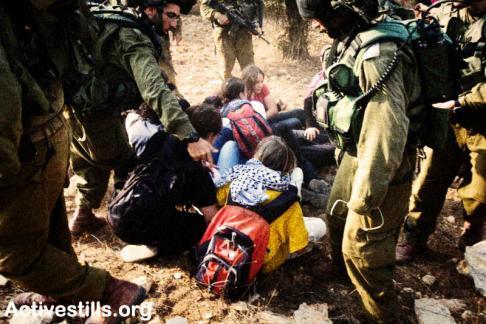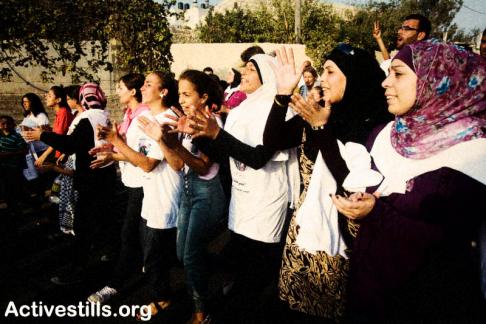The army imposed siege on the village of Nabi Saleh, preventing many from entering or passing through the village and detaining dozens in order to prevent the residents and their supporters from marking International Peace Day.
The people of Nabi Saleh intended to mark International Peace day by holding a cultural festival in their tiny hilltop village. The Israeli army, however, had different plans. The village of Nabi Saleh woke up in the morning to find all exits and entrances to their village blocked by large forces preventing anyone from going in or out, in a way that cut off not only Nabi Saleh itself from the rest of the world, but also five other villages. Additional forces were scattered through the olive groves around the village to prevent people trying to get in by foot from reaching their destination.
While three busses and many cars packed with people who came to participate in the event from across the west Bank were turned back, dozens did manage to make their way into the village, walking long distances, sneaking in through the olive groves in the sweltering heat.
Despite the rigid closure imposed on the village, the day’s events proceeded as planned, even if in smaller numbers. People cleaned the streets of the village from the countless grenades and projectiles still on the floor – evidence to yesterday’s events and military violence. People then gathered to make and listen to speeches and see pictures portraying the village’s struggle.

While gathered together, word got to the group that some forty people, most of them students from Bir Zeit University who came to participate in the event, were detained by the army and held by the village’s school. On hearing the news, everyone gathered together and headed there, determined to have the detainees released.
The ten or so soldiers who guarded the detainees were swamped by the more than a hundred people who marched at them, crossed through their line, mixed with the detainees, and started marching away. The soldiers did try and prevent people from leaving, using concussion grenades and ordinary blows, but to no avail. Five – one international and four Israelis, none of them from those initially detained – were eventually arrested, as the rest managed to walk away.
The day’s original plan was for the event to end with a small march to the contested water spring, where settlers have recently placed signs in Hebrew, naming it after a settler who was killed during the second Intifada. Villagers intended to replace that sign with a sign in Arabic and English, declaring the spring (called Ein alQous for hundreds of years) as Emily’s Spring, in honor of ISM activist, Emily Henochowicz, who lost her eye after a tear-gas projectile was shot directly at her face.
Energized by their success in releasing the many detainees, people, lead by the village’s women, marched down towards the spring singing and chanting, only to find themselves greatly unnumbered by soldiers at the center of the village. When it became clear that they could not proceed, protesters sat on the ground for some minutes and then retreated back into the tent where they were previously gathered for the speeches.
The hilltop village of Nabi Saleh is home to approximately 550 residents and is located 30 kilometers northeast of Ramallah along highway 465. Residents have been holding regular demonstrations against the creeping confiscation of their lands by the adjacent Jewish-only settlement of Halamish since December 2009, when protest was sparked after settlers, abated by the Army, forcefully took over a natural spring belonging to the village.
Originally posted on the Popular Struggle Coordination Committee.

